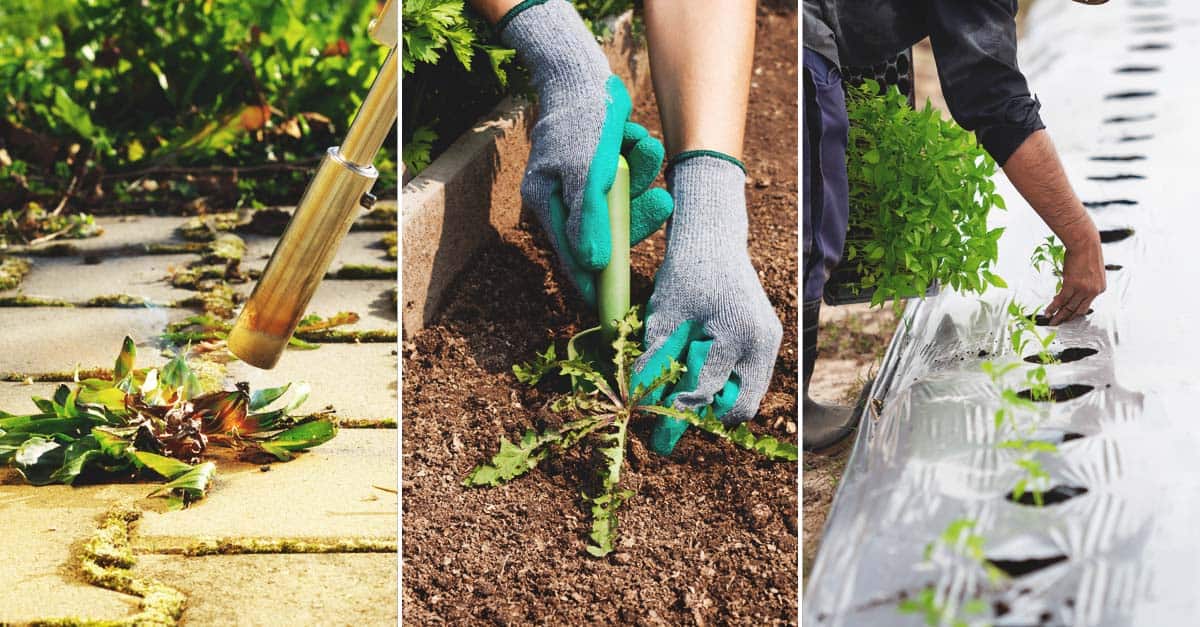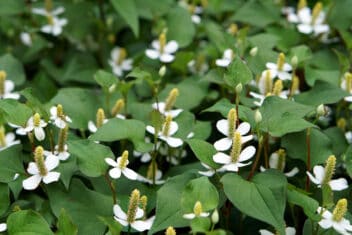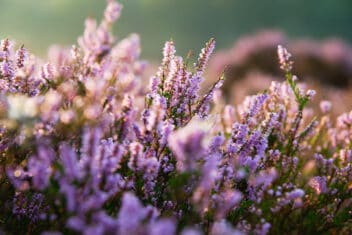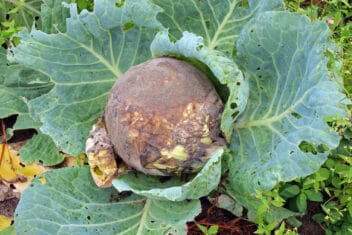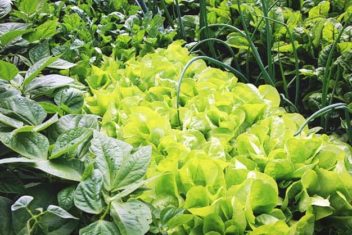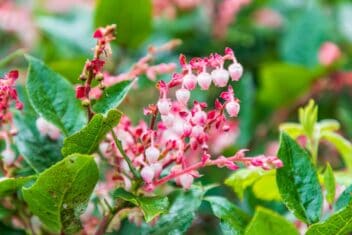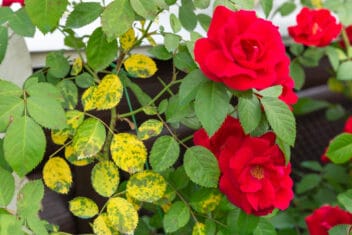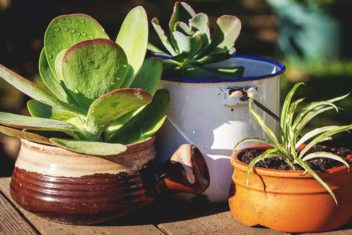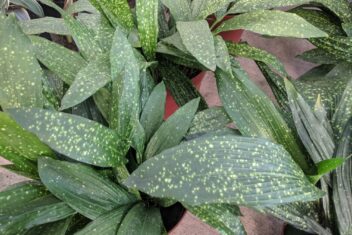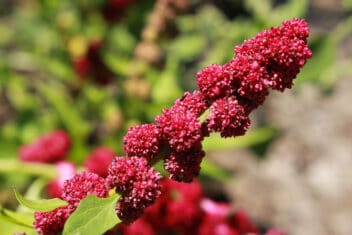I’m all about finding quick and easy ways to deal with the less exciting parts of gardening, but sometimes I don’t want to use harsh chemicals to control weeds. It’s a conundrum. That’s where organic weed control comes in. You can get weeds under control without much fuss or all the chemicals.
Weeds are the bane of my existence. As a gardener, I find them to be one of nature’s most annoying pests. Squirrels? Fine, at least they’re cute and fluffy. Birds? I love em’! Insects? Some are good, some are bad.
Weeds, though? They’re a serious nuisance. If you have an out-of-control weed problem on your hands, it can feel like an impossible situation to resolve. Aggressive growers can quickly take over a green space.
This is the point where I should point out that the concept of a weed is something we’ve dreamt up. There are no good or bad plants, just plants that we don’t want growing in certain places.
Weeds are the plants we don’t want around our beautiful flowers and juicy tomatoes. I try hard to approach weeds with a nuanced attitude. Sure, they might ruin my day on occasion, but it’s my perception of the dandelion that turns it into a weed.
When weeds start to encroach on precious growing space, though, it’s tough not to declare war. So what’s a gardener to do when unwanted plants creep into the mix? Consider organic weed control methods, of course!
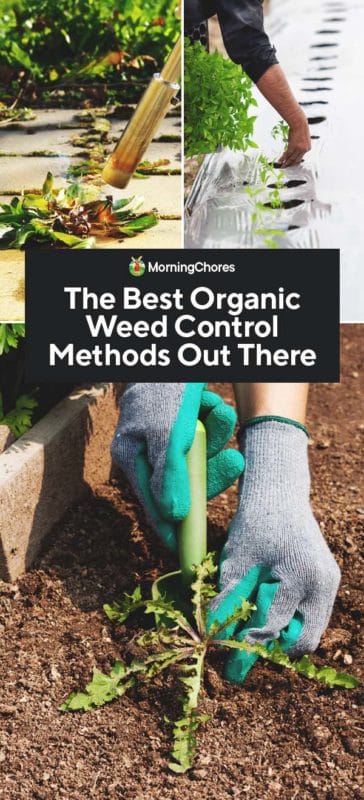
What is Organic?
Organic methods are categorized as such because they don’t involve synthetic chemicals. That doesn’t mean that all organic pest control methods are chemical-free.
The word ‘chemical’ has a bad wrap and is often used as a buzzword to connote something negative. But we live in a world of chemicals. If you’ve ever sat in a chemistry class and learned about the periodic table, you’re aware of this.
Organic weed control methods involve mechanical and biological controls. Ingredients used in organic pest-control concoctions are typically naturally derived.
Benefits of Organic Weed Control
Why not just blast your garden or grass with Roundup or other potent weed killers? Here are a few key advantages to opting for organic pest control methods:
No risk of contaminating soil or nearby water sources. Synthetic weed control chemicals carry with them the chance of producing run-off, which may contaminate waterways and soil. This can throw ecosystems out of whack and cause health problems. In a small garden space, using synthetical chemicals to control weeds may produce adverse effects in your garden by affecting the health of your soil.
No risk of damage to nearby plants. Any strong chemical, if not diluted, can harm plants – organic formulas included – however, collateral damage is a significant risk when using potent synthetic weed killers.
No risk to bees and other pollinators. Certain non-organic pest and weed control products may have a direct impact on bee and pollinator populations.
Inexpensive compared to non-organic methods in many cases. A lot of concentrated non-organic weed killer products are super pricey. Organic methods, in comparison, are cheaper and more accessible for the home gardener.
No health concerns with organic methods. You typically don’t have to worry about health-related side effects when using organic weed control methods, like you would with something like Roundup.
Mechanical Methods
Let’s get into the nitty-gritty breakdown of how to control weeds using organic methods. There are two main ways to eradicate weeds organically; mechanical and chemically.
Mechanical weed control involves physical strategies for removing or preventing weed growth. Here are a few mechanical weed control options:
1. Organic Mulch
Options include wood chips, leaf mold, coco coir, etc. When mulching to suppress weeds, it’s important to remove weeds before adding the material. Unless you’re applying a super thick layer of mulch, it’s not enough to completely kill off weeds. Check mulch product reviews to ensure there’s no weed seed inside. Don’t use too much mulch, either. This may harm other plants in your garden by suffocating roots. There are pros and cons to different types of mulch, so do your research.
2. Black Plastic Mulch
This is a synthetic mulch option ideal for dealing with severe weed growth in large beds or a substantial growing area. Covering the soil with black plastic mulch encourages a process called solarization, which eventually kills off weeds and any weed seed.
3. Physically Pulling Weeds
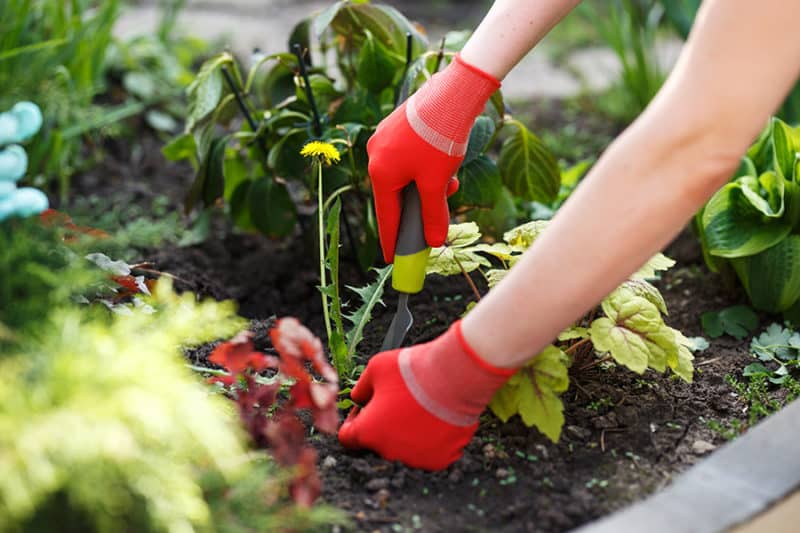
This is the most basic weed control method. It’s a convenient option for small gardeners, but it’s not particularly useful for those with multiple, spacious beds. When pulling weeds, be sure to get the WHOLE plant and not just the tops. Leave the roots behind, and the plant will no doubt grow back. Use tools to help with the process, if needed.
4. Blockage
Use things like cardboard, newspaper, and landscape fabric as organic weed control to block weeds from growing in a newly installed garden. If you’re starting raised beds, always use one of these materials at the bottom of each bed before adding soil.
5. Flame
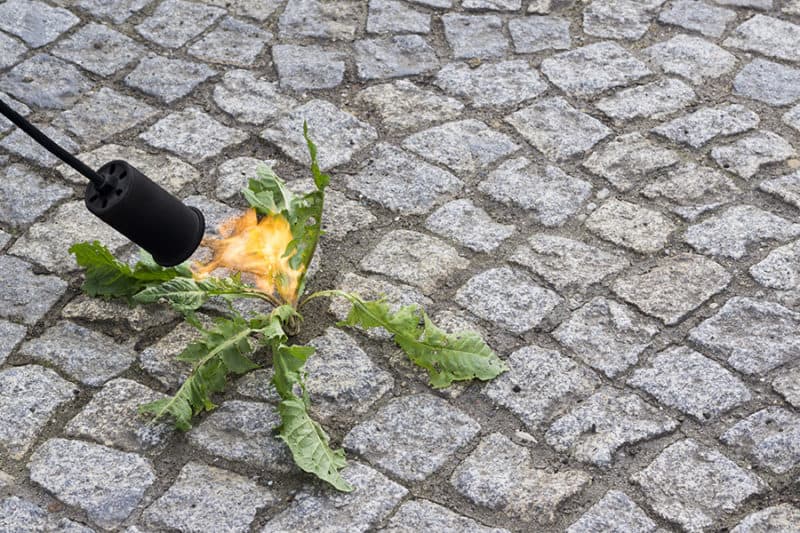
This is probably my ideal weed control method, though my husband is not keen on my enthusiasm for burning unwanted plants. It’s why I still don’t have a flame weeder in my shed. He’s concerned I’ll burn the house to the ground somehow. He’s also probably correct, but I stand firm in that it’s a practical and magnificent manner to rid your yard or garden of weeds. It requires care and caution, though.
6. Ground Cover
Use ground cover plants to fill your garden beds during fallow periods or over the fall and winter. Using this strategy fills your beds, so weeds aren’t able to take up residence.
7. Tight-Spacing
Drown out the weeds using close-cropping methods like the Square Foot Gardening method. If plants are spaced close together, there’s less of a chance for weeds to grow up between them.
Chemical Methods
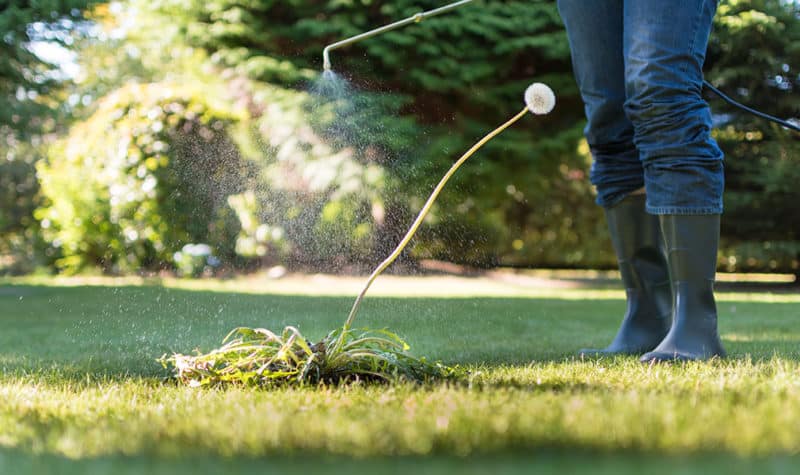
If you don’t want to go the manual route, consider the chemical methods of organic weed control. You can choose from a variety of store-bought or DIY organic herbicides. These are often less potent and don’t come with health concerns of products like Roundup, but there’s still the risk of damaging soil health when using herbicides — organic or not.
Use too much, and you may throw the soil’s nutrient makeup out of balance. Organic herbicides are also not usually as effective as gardeners expect them to be. Still, they’re a perfectly suitable option when used correctly.
How to Prevent Weeds
Prevention is the best medicine in health and gardening. Instead of fixing problems as they crop up, I’m far more inclined to try to prevent them. When pests or weeds pop up in the garden, it’s a stressful situation that requires a lot of effort to resolve. Wouldn’t you rather try to prevent an outbreak in the first place? Here are a few strategies for weed prevention:
- Use soil and compost mixes that are free of weed seed. Hidden seeds can quickly infect your previously pristine garden.
- Pull invasive plants before they go to seed. Weeds are often a problem not because they’re ugly (dandelions are a good example) but because they spread so aggressively. Pulling or topping weeds before they go to seed prevents the plants from taking over.
- Create a healthy garden environment with good-quality soil. Focus on building healthy soil, and you’ll find yourself rewarded with an easy-to-manage garden.
- Avoid digging and tilling the soil too frequently to prevent dormant weed seeds from emerging from the earth. Don’t turn the soil unless you need to. It’s not necessary and increases the chances of hidden weeds coming to the surface.
- Don’t use hay in your garden, which often contains weed seeds — use straw instead. It’s easy to confuse the two, but never buy hay for your garden. Use straw! It’s excellent for mulching and can even be used as a growing medium.
- Always carefully consider before planting something. Many plants can turn into weeds if planted in the wrong area or region. Do your research before planting something new. Mint, for example, is an aggressive grower than will quickly take over a garden if given the opportunity, which is why it’s usually grown in containers.
- Be careful when adding stuff to your compost pile. Tossing all your garden refuse in the compost pile is a bad habit. Avoid throwing diseased and pest ridden plants and never throw weeds into the compost – keep those for your city’s brown bin, instead.
- Stay away from anything that purports to be a quick fix. Whatever it is, don’t believe the claims. Your garden won’t be fixed overnight, regardless of the issue at hand. Whether it’s weeds or pests causing issues, a quick fix is usually not the right answer and may even cause other problems in the long term.
While organic methods may require a bit more time and effort, you’ll be rewarded in the long run with a healthier, happier garden environment. I’m a fan of manual pulling and tight plant spacing, but what’s your favorite?
